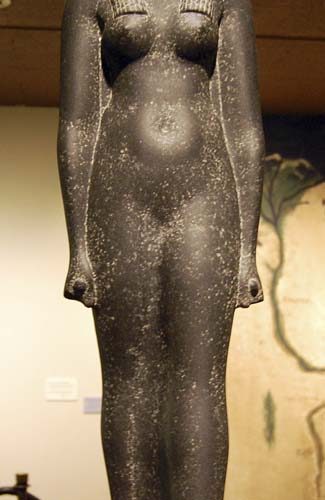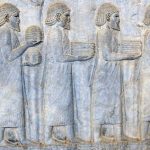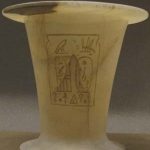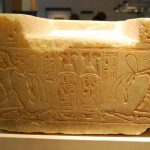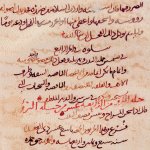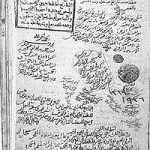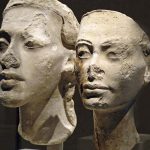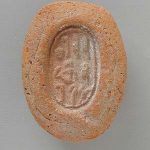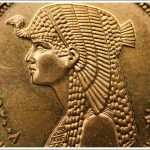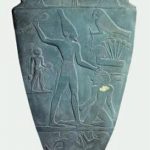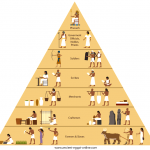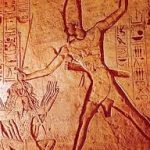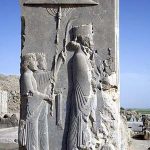Raised to Rule

© Tiffany Silva – Statue of Queen Cleopatra
For more than 300 years, Cleopatra’s family ruled Egypt. She was born the third child of King Ptolemy XII in 69 BC. Her name meant “glory of the father”. Cleopatra’s two older sisters died before her father, leaving her with the rights due to the firstborn child.
Although it is not clearly stated in historical texts, some Egyptologists speculate that Cleopatra’s mother was the king’s sister, Cleopatra V Trypaena. Other historians point to texts that indicate that she was an illegitimate child of the king.
Debate exists over the ethnicity of Cleopatra. While most scholars consider her to be of Greek lineage, a few argue that she was of African blood. In either case, the Ptolemy family was not of Egyptian origins.
Little is known of Cleopatra’s childhood, except that she was being groomed as the future leader of the country. Unlike the rest of her family, Cleopatra took great interest in Egyptian history and religion. She was the only member of her family to learn the Egyptian language.
Cleopatra became co-ruler of Egypt at the death of her father in 51 BC. Egyptian law forced her to share her new role as pharaoh with Ptolemy XIII, her younger brother. In fact, she would never be the sole ruler of Egypt in name, sharing the official title with her brothers and her son.
Divine Queen
At only 18 years old, Cleopatra became Queen of Egypt. She was most likely married to her brother, who was eight years younger. The young couple ruled an empire that included Egypt, Cyprus, parts of Libya and various Middle East territories.
Cleopatra used the Egyptian religion learned during her childhood to identify herself as the new version of the goddess Isis. By also later fashioning herself as the goddess Aphrodite, she revealed her family’s Greek roots.
Egyptian texts reveal Cleopatra to be very popular leader among her own people. In a papyrus dated 35 BC, Cleopatra is referred to as “Philopatris”, or “she who loves her country”.
The Queen carefully crafted a pageantry of luxury and embellishment, although she was not simply the golden seductress featured in Hollywood movies. Egyptologists consider her ability to reinvent herself to fit any situation to be a key part of her brilliance in politics.
Ancient Egyptian records reveal Cleopatra to be an intelligent and powerful ruler. The philosopher Plutarch described her not as a stunning beauty, but as a captivating, persuasive and charming leader.
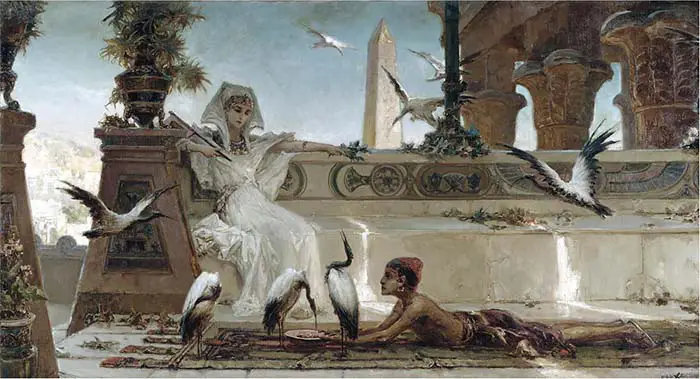
@ Sofi – Cleopatra, painting by Vasily Alexandrovich Kotarbinsky
Roman Influence
Although Egypt remained a large and wealthy empire, a new, more powerful force was rising. In 168 BC, almost 100 years before Cleopatra’s birth, Rome became an overseer of Egypt and the Egyptian royal family. An alliance between the two empires helped keep the Ptolemy family in rule over their fading empire.
At the death of Cleopatra’s father, the Roman leader Pompey was appointed guardianship over Cleopatra and her brother. His duty was to ensure tributes were paid to Rome on behalf of Egypt.
Sibling Rivalry
Approximately one year into her reign, Cleopatra took advantage of the age difference and decided to ignore the co-regency of her brother. She removed his name from all official documents. Craftsmen designed legal tender featuring her name and image.
For three years, the Queen ruled without regard to her brother. During this time, she began to worry court officials by her actions. They considered her brother easier to control, so they plotted to overthrow her in favor of her brother.
In 48 BC, her brother, under the care of his advisors, forced Cleopatra to flee from the royal capital of Alexandria. She reacted by forming an army among the Arabian tribes east of Pelusium.


